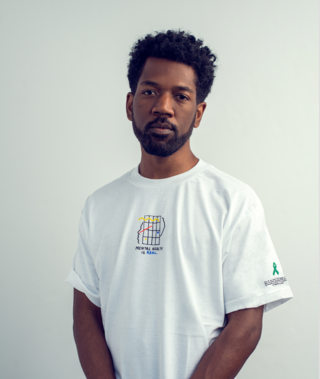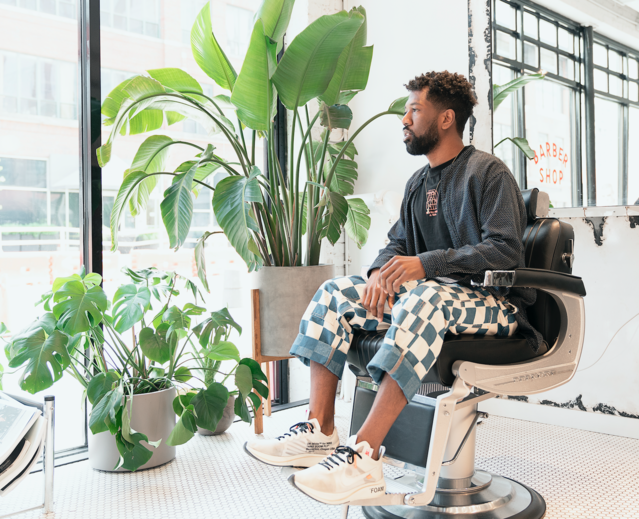Health
Art As a Healing Expression With Brandon Breaux
Chicago-based artist advocates for conversations about mental health: Part 1.
Posted April 14, 2019
Contributions to this article by Dr. Michele Kerulis and Jennifer Robertson

Time seemed to stand still as the sun beamed and people flooded outdoors to enjoy a beautiful day in Chicago. I found a quiet spot at a lively rooftop where I planned to meet Brandon Breaux, a brilliant artist and changemaker, for a chat about his passion and his process.
I glanced at the smiling faces around me; they appeared not to have a care in the world. But I knew that some were masking their true feelings. In fact, according to the World Health Organization (WHO), one in four people in the world will be impacted by a mental health issue at some point in their lives. And although treatment is available, WHO reported that two-thirds of people who have a mental health issue won’t seek help because of the stigma. Maybe some of the people around me feared being judged as imperfect. As a counselor, I wondered how many had reached out for assistance in the past.
That particular stigma is one reason why Breaux developed a platform for people to explore their own well-being through art and creative expression. Breaux, whose enthusiasm about art and artistic expression is contagious, is well-known for his conceptual art installations, Instagram illustrations, Bud Light Lollapalooza designs, Chance the Rapper album art, and community initiative FieldTrip. All of his projects use creative expression to encourage people to start conversations about art, society, and healing.
I first met Breaux in a weekly meditation class. Fascinated by his visual descriptions of his interpretation of our guided meditations, I approached him after class. “You must be an artist,” I said. “You have the words to visually describe what others cannot.” The more we talked, the more I was intrigued by the passion behind Breaux’s lifelong study of artistic expression and the impact art has had on him personally and professionally.

According to Breaux, art heals. And many mental health researchers agree. A collaborative study between Pennsylvania State University’s Department of Medicine and the Harvard School of Public Health revealed the connection between art, healing, and public health. Art has been a part of our culture since before the beginning of recorded history, but art as a healing profession has only been recognized since the 1940s. The study’s authors noted, “This need for meaning and relevance in daily experience has long been recognized as one of the fundamental driving forces in artistic creation and engagement.”
People have a strong need to find meaning in their lives. Viktor Frankl’s Man’s Search for Meaning, one of my favorite books, explores the “why” behind living that fuels our ability to endure suffering. Researchers have highlighted Frankl’s work and have drawn conclusions between finding meaning, making art, and understanding spirituality.
Theresa Van Lith, a researcher from La Trobe University in Melbourne, Australia, examined art as a catalyst to the mental health recovery process. Through her research of literature related to art, mental health, and spirituality, she highlighted “a congruence between [her] participants’ experiences of spirituality and Frankl’s (2006) definition [found in Man’s Search for Meaning] of the ‘will to meaning,’ which he later coined ‘logotherapy.’” Through the art-making process, Van Lith noticed that her participants searched externally to understand what was important to them internally. Their identification of significance developed with the realization that understanding what it is to be human has to do with more than just one’s own self-interest.
Other researchers support the idea that making art is directly related to mental health recovery. Helen Spandler and her research team suggested that people who use art projects to address mental health concerns can find healing with art by fostering hope, creating a sense of meaning and purpose, developing new coping mechanisms, and rebuilding identities.
Her research team came to an enlightening conclusion: “Arts and mental health initiatives could make an essential contribution to the future of mental health...” The team also noted that their participants perceived art making as a direct link to their sense of spirituality.
As an artist, Breaux agrees with the ideas behind mental health research.
“Hearing about mental health awareness, right now, is trendy,” he said.
Beyond just expanding awareness about mental health in general, Breaux said it is vital that our society makes connections between mental health and developing a greater sense of meaning and connection in our lives.
Join us for Part 2 of my conversation with Brandon Breaux to learn about how he turned art into action with his Mental Health is Real campaign.


